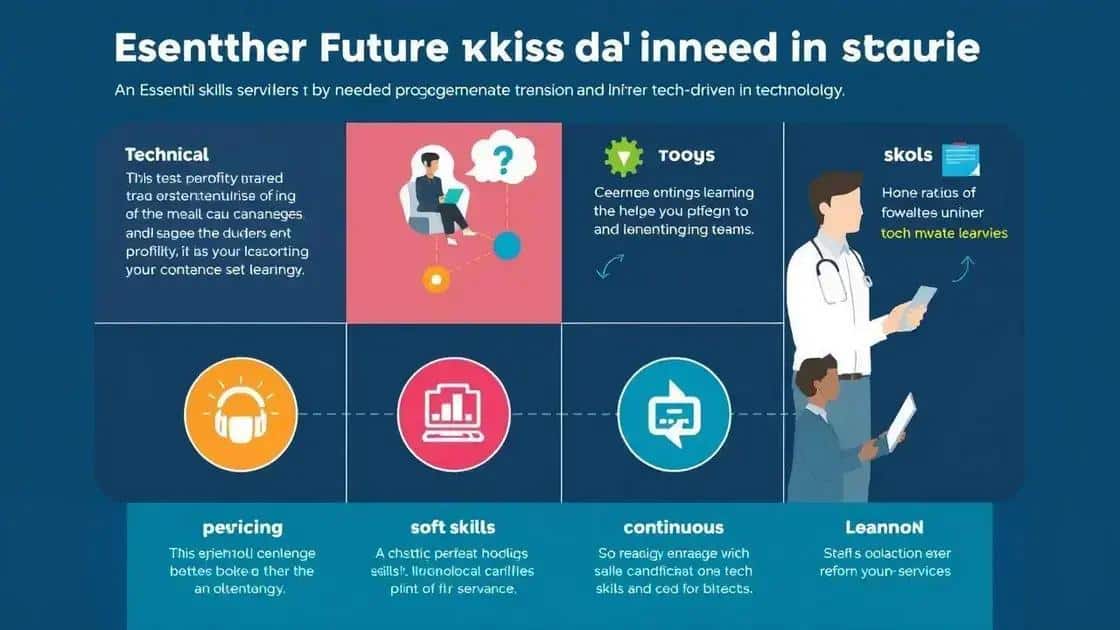2030 Financial in Future of Services: The Tech Revolution

The future skills needed in tech-driven services include technical proficiency in tools, strong soft skills for teamwork, and a commitment to continuous learning to adapt to evolving technologies.
2030 Financial in Future of Services is set to redefine how we interact with businesses. Have you considered how technology will transform service experiences in just a few years? In this article, we’ll delve into the trends and innovations that are paving the way for the future.
Emerging technologies shaping finance
Emerging technologies are reshaping finance in profound ways. They are not only improving efficiency but also enhancing the way financial institutions interact with customers. As we dive deeper into this topic, we will explore how innovations like artificial intelligence and blockchain are being integrated into financial services.
Artificial Intelligence in Finance
Artificial Intelligence (AI) is revolutionizing the financial landscape. This technology helps institutions manage risks, detect fraudulent activities, and personalize services. By analyzing vast amounts of data, AI detects patterns that humans may overlook. This leads to faster decisions and more effective customer service.
A few key applications of AI in finance include:
- Fraud detection: AI systems can flag unusual transactions in real-time, preventing potential fraud.
- Customer service: Chatbots and virtual assistants provide customers with 24/7 support, answering queries instantly.
- Risk assessment: AI tools analyze client profiles to determine creditworthiness more accurately.
Blockchain Technology
Blockchain is another game-changer in finance. It creates a secure and transparent way to record transactions. Unlike traditional methods, blockchain reduces the need for intermediaries. This not only cuts down costs but also speeds up transaction times.
Furthermore, blockchain technology has been instrumental in:
- Smart contracts: These self-executing contracts take away the need for third parties, reducing delays.
- Decentralized finance (DeFi): This movement allows people to access financial services without traditional bankers.
- Tokenization: Assets like real estate can be represented digitally, making them easier to trade.
By integrating these emerging technologies, the finance sector is not just becoming more efficient; it is also becoming more accessible. Traditional barriers are being lifted, allowing more individuals to participate in the financial system.
The role of AI in service delivery

The role of AI in service delivery is becoming increasingly vital. As technology advances, businesses are leveraging AI to streamline operations and enhance customer experiences. Today, AI-driven solutions are not just optional; they are essential for staying competitive in various industries.
Improving Customer Interactions
AI significantly improves customer interactions by using personalized data. Companies can analyze customer behavior and preferences to tailor services accordingly. This means customers receive recommendations that fit their needs, leading to higher satisfaction.
One effective application of AI in customer service is chatbots. These virtual assistants can:
- Provide instant support: AI chatbots offer 24/7 assistance, resolving issues without delay.
- Enhance response accuracy: They can quickly access vast databases, delivering correct answers to inquiries.
- Learn from interactions: Over time, chatbots learn from customer interactions, improving their responses.
Streamlining Operations
Beyond customer service, AI aids in streamlining operational processes. Businesses can automate repetitive tasks, allowing employees to focus on more strategic activities. This boosts productivity and efficiency across various departments.
AI tools can handle tasks such as:
- Data entry: Automating data input reduces human error.
- Scheduling: AI can efficiently manage appointments, optimizing time.
- Inventory management: Predictive analytics helps in maintaining stock levels efficiently.
By integrating AI into daily operations, companies can cultivate a dynamic work environment. The emphasis shifts towards innovation and growth, driving businesses forward.
How blockchain is changing transactions
Blockchain technology is transforming the way transactions are conducted across various sectors. This innovative system provides a secure, transparent, and efficient method for recording transactions. With its decentralized nature, blockchain eliminates the need for intermediaries, which can simplify processes and reduce costs.
Enhanced Security
One of the most significant advantages of blockchain is its enhanced security. Each transaction is recorded in a block and linked to previous transactions, creating a complete chain. This structure makes it nearly impossible to alter past transactions without detection, providing trust and reliability.
Some key security features of blockchain include:
- Encryption: Blockchain uses advanced cryptography to protect transaction data.
- Immutability: Once recorded, transaction data cannot be changed without consensus from the network.
- Decentralization: Having multiple copies of the blockchain across nodes ensures that no single entity has control over the entire network.
Faster Transactions
Blockchain is also known for speeding up transaction processes. Traditional banking systems often involve multiple layers, which can delay transaction completion. In contrast, blockchain transactions can be processed almost instantly, regardless of geographical boundaries.
This is especially beneficial in sectors such as:
- International payments: Sending money across borders becomes quicker and less expensive.
- Supply chain management: Real-time tracking of goods ensures efficient operations and timely deliveries.
- Real estate transactions: Smart contracts automate processes, reducing paperwork and processing times.
By fostering transparency and reducing delays, blockchain is paving the way for a new era of transaction processing. As industries continue to adopt this technology, we can expect more innovations that will further improve efficiency and trust.
Future skills needed in tech-driven services

As technology continues to evolve, the landscape of service delivery is changing rapidly. Companies are increasingly seeking professionals with a unique set of skills. These future skills are essential to thrive in tech-driven services and ensure that businesses remain competitive.
Technical Proficiency
One of the most important skills is technical proficiency in various tools and platforms. Professionals must understand how to use software solutions and digital tools effectively. This knowledge allows employees to operate in a digital-first world.
Some critical technical skills include:
- Data analysis: The ability to interpret and leverage data for decision-making.
- Coding skills: Understanding programming languages can enhance operational capabilities.
- Cybersecurity awareness: Knowledge of basic security principles to protect company data.
Soft Skills
While technical skills are vital, soft skills are equally important in tech-driven environments. Strong communication and collaboration skills enable teams to work efficiently, especially when facing complex challenges. Professionals must also adapt quickly to new technologies and processes.
Essential soft skills include:
- Critical thinking: The ability to analyze situations and make informed decisions.
- Adaptability: Adjusting to changing circumstances and new tools rapidly.
- Emotional intelligence: Understanding and managing one’s emotions and empathizing with others fosters teamwork.
In addition to these skills, continuous learning and upskilling are vital. The pace of technological advancement means that workers must embrace lifelong learning. By staying updated with industry trends, professionals can remain relevant and competitive.
In conclusion, the future of tech-driven services demands a unique blend of skills. As technology evolves, so must the workforce. Technical skills such as data analysis and cybersecurity are essential. Additionally, soft skills like adaptability and emotional intelligence will help professionals thrive. Embracing continuous learning is crucial for staying relevant in this fast-paced environment. By developing a strong skill set, individuals can prepare for exciting opportunities in the ever-changing landscape of technology.
FAQ – Frequently Asked Questions about Future Skills in Tech-Driven Services
What are the essential technical skills needed for tech-driven services?
Essential technical skills include data analysis, understanding software tools, and basic coding knowledge to effectively navigate the digital landscape.
How do soft skills impact success in tech-driven environments?
Soft skills such as communication, problem-solving, and teamwork are crucial for collaborating effectively and adapting to changes in tech-driven sectors.
Why is continuous learning important in technology?
Continuous learning helps professionals stay updated with the latest trends and tools, ensuring they remain competitive and relevant in their fields.
How can I improve my adaptability to new technologies?
You can improve adaptability by engaging in regular training, seeking feedback, and practicing using new tools and technologies in real-world situations.






